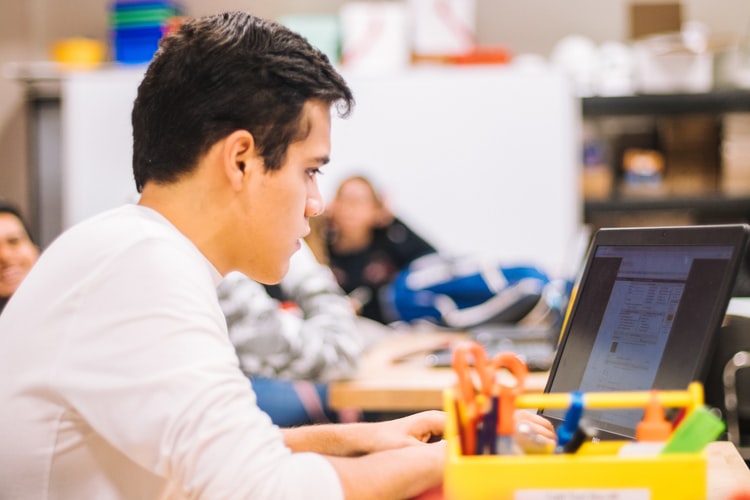The teenage years are an essential time for many reasons. With the focus on getting good grades in high school and getting into a top college, it’s easy to overlook certain aspects. It’s the fact that teens should be developing the skills to last them a lifetime, not just to get them into a four-year university.
The four years spent in high school should also be spent preparing teens to become independent, productive members of society who know how to both survive and thrive on their own. While the high school itself helps teens develop some of these life skills and responsibilities, it’s not enough to mold them into the successful adults they should become.
It falls on parenting and supporting teens in non-academic pursuits and extracurricular activities to help them fully develop the skills to spearhead their successful future.
Luckily, once you know the various skills to cultivate in your teen, it’s easy to find opportunities in their life to help hone each valuable trait.
Related: 10 Business Ideas for Teens
Business Skills

Decision Making Skills
Most adults enter the business world in some form or another; it could be as an employee, an employer, or an entrepreneur. Either way, teens must begin to cultivate those valuable business skills early on in their life. Once they get their first job or internship, they’ll be thrown into the real world, and the more of a business skillset they have, the better off they’ll be.
Decision-making is a prime example of simple but necessary business skills. In college, in jobs, and life in general, successful people need to be able to take in information, assess a situation, and make the best decision based on the information at hand.
Teens can begin to develop this skill by participating in debate teams or pursuing programs like Beta Bowl, in which they plan, build, and launch their own business. Involvement in these types of activities requires teens to rely on their research abilities, analytical thinking and inductive reasoning, and problem-solving and intuition to come to important decisions.
Teens who participate in these activities can hone those skills and have a clear example to point to for college admissions officers who are seeking each trait in successful applicants.
Analytical Skills
Analytical skills are another vital trait that students will most definitely need in school and the business world. Business, much like the real world, isn’t merely about memorizing facts and regurgitating information. It’s also not a series of simple “yes or no” choices.
Oftentimes, business in real-world scenarios requires a critical, analytical mindset to unbiasedly and comprehensively evaluate a situation. Each potential path to move forward and use those skills to determine the best course of action.
Working on group projects, problem-solving cases, and extracurricular activities that require teens to employ these skill sets in a meaningful and current manner is a great way to develop these analytical abilities.
Does your teen need to develop more life and business skills? Check out our entrepreneurial programs for your teen. Visit Beta Bowl for more information.
Adaptability
Adaptability is another crucial life skill that few teens truly master in high school. It can make a massive difference in propelling their success in college, a career, and beyond.
In business, there will be a constant ebb and flow of obstacles and changes that your child will face in the future, whether as an intern, employee, or boss. Teens must be equipped with the skills and experience to turn lemons into lemonade. The idea is to teach them to adapt to the changes and unfamiliar or uncomfortable situations that they could face in the workforce.
A great way to foster adaptability is to challenge your teen to think through potential roadblocks they may face in any given scenario and to formulate a handful of possible responses and solutions.
In programs like Beta Bowl, we require students to come up with multi-faceted strategies and solutions so they’re always ready to adjust or pivot if unforeseen issues arise. In business and life, we often have to roll with the punches, and the most successful people are the ones who can think ten steps ahead and avoid getting shaken by those obstacles when they appear.
Related:Beta Bowl Program
Thinking on Your Feet

Similar to adaptability, sometimes the way we respond to unforeseen obstacles is by thinking on our feet, and this is something teens should learn to do as well.
There will most likely come a time when your child is thrown a question or problem, with no prior warning, and has to come up with an answer or solution on the spot. This may take place in a high school or college classroom, in a thesis paper argument, at a debate team meeting, or on a real job. The more practice your child has in this area, the better they will fare in these situations.
The best way to hone and exercise this skill is to put your child in simulated or real-life scenarios that require on-the-spot responses or decisions. You can do this through formal extracurricular activities, a family speech and debate night, or board games that require this type of quick-thinking action. With these creative avenues, you can help cultivate this skill in your child to best prepare them for the real-world scenarios they will most likely face.
Entrepreneurial Skills
Self Confidence
Self-confidence is the ability to trust yourself and feel a sense of control in your life. It enhances our quality of life and is the foundation of almost every other life skill. Providing an environment where your teen can develop this confidence in their own judgment, abilities, and skills will serve them for their entire lives.
Self-confidence is built from internal and external sources.
- External sources may include your teen’s academic performance, the praise and approval of others, and their own appearance.
- Internal sources may include independent thinking and moral behavior or being what they consider to be a good person.
It isn’t enough to tell your child how wonderful they are; they have to believe it themselves and internalize it. So, here are several ways to help your teen develop self-confidence:
- Love them unconditionally. Ensure that your teen knows that your love and approval do not depend on their grades, behavior, or other factors.
- Allow for failure. When things don’t go well, be assured that you (and your teen) can rebound and still enjoy success at the things that are important.
- Praise their process. Acknowledge all the work and effort your teen puts into achieving their goals, not just the final outcome.
- Encourage self-compassion. Teach them by word and example to treat themselves kindly.
- Embrace a growth mindset in your home. Be a family that believes you can continue to grow and expand who you are and what you can do.
- Listen to their opinions and ask for their advice. This will demonstrate that what they think and have to say is of value.
Problem-Solving Skills

Successful entrepreneurs are problem-solvers. This skill is needed for the conception, building, and maintaining of your teen’s business. Critical thinking is essential to being an effective problem-solver. This skill may be developed in your teen by questioning them in ways that show them how to evaluate their situation and make sound judgments. You may need to prompt ideas if they’re stuck or about to make a significant error. You may feel tempted to step in and solve their problems, and you may have to if things become severe. But it is more valuable to them to come up with their own solutions while knowing that you are there for them.
Your participation will validate their concern, and your questions will keep the problem defined in their minds until they learn to do it for themselves.
Initiative
The ability to see something that must be accomplished and to take positive action to address it is a valuable skill. Entrepreneurs are people who see problems and set about to create solutions for the benefit of others. Your teen will have to develop an eye for opportunities and be able to see situations from several viewpoints. Then your teen needs to have the courage to take action.
You can teach your child to take action by demonstrating the same trait in your life. Teens model behaviors they see, so ensure they know it when you take the initiative in your life.
Personal Skills
Self-reliance
As teens approach college and adulthood, it’s incredibly important that they become as independent, confident, and self-reliant as possible.
The transition from high school to university can be an abrupt process, and the most significant adjustment has to do with the level of independence students are granted. From living with parents and following a high school schedule to living on their own, taking care of their personal needs, and managing their unique university schedule. This change can be a lot for many teens, so it’s best to encourage your child’s independence as early as possible, especially as they approach college.
This can mean simple and obvious things, like having them make their lunch and manage their schedules. However, it can also mean more challenging things, like pushing them to embark on independent projects, participate in community service, get a job or internship, or embark on an entrepreneurial project.
For example, teens who start businesses in high school understand what it means to be independent and self-reliant. This understanding stems from the experience of being responsible for an entire company. This is both a great way to cultivate that independence and confidence, combined with exciting activities that will help them shine on college applications and differentiate them from their peers.
Related: Activities to Help Your Teen Discover Their Passion and Purpose
Personal finance
Among the various aspects of being an independent adult, personal finance is a factor that many teens fail to master. To avoid financial stress and money management problems for your teen, you should begin teaching them these skills now.
Teens should learn about budgeting, necessary versus discretionary expenses, and the reason for and value of saving. They should also understand the difference between cash, debit, and credit cards and the unique value of each option.
If you can help your teen open a bank account while they’re in high school, this is a great learning opportunity to allow them to manage the account. That way, you can impart ongoing wisdom as you review their monthly statements with them. This is also a great option if they have a job or receive some type of allowance, so they can begin practicing smart money management skills now.
You don’t have to give your teens every detail about your family’s financial situation, but it’s a good idea to be transparent with them. You want to share aspects of your money values, how you view savings, how you use credit the right way, and how they can prepare you to be financially independent in the future.
Organization

Though it isn’t a huge focus in school, organizational skills are just as crucial for a teen’s future success as is learning basic arithmetic. However, being one of those “soft skills,” it doesn’t always receive as much emphasis as it should until it becomes a problem.
This can manifest itself in overwhelmed and disorganized college students scrambling to find their textbook or an underperforming employee, forgetting to complete tasks that didn’t make the to-do list. Either way, the solution is to nip this in the bud and ensure your child has his or her organizational skills down-pat.
In part, this means shifting some of the responsibility for their success from you, the parent, to them, the child. Teens should be keeping track of their school assignments, maintaining a daily to-do list, and keeping their belongings and space in an organized fashion.
You don’t need to be a drill sergeant about cleanliness to help your teen get better organized. However, you should convey to them that they need to take responsibility for their things, their schoolwork, and their schedule. Keep in mind that a lack of parental safety net might entice them to step up to the plate.
You can also share examples of highly successful people who have opted for very rigid or straightforward methods of organization to streamline their decision-making time and relate this to your teen’s future as well. The more they make a habit of keeping their life organized and in good order, the more time they’ll have to focus on both work and fun. With an organized mindset, they can be successful and have more hours in the day to do whatever they want.
Emotional Skills
Listening
Listening skills might seem rudimentary, but they’re nonetheless essential, and something students may not fully master in the classroom. Of course, students need to listen to their teachers, but it’s also necessary that they learn to listen to their peers and the viewpoints of those around them.
Once they reach college, adulthood, and a career, they’ll be thrown into a much more diverse pool of people and perspectives. Those who are successful in both their interpersonal relationships and their corporate ones have mastered the ability to listen, take others’ viewpoints into account, and respond with as little bias or judgment as possible.
As parents, we can help our teens develop these skills by discussing controversial issues or explaining contrary viewpoints to them, and emphasizing the importance of considering diverse perspectives.
Coping with ‘Negative’ Emotions
A common question on college prompts, job applications, and interviews are “tell me about a time you failed and how you dealt with that failure?” This is no mistake, and it’s also not because universities and employers are obsessed with failure. They want to know how the candidate overcomes difficult or negative situations and emotions.
A successful applicant should have multiple stories on hand. These stories should indicate not only how they dealt with failure, but how they used the negative emotions that came with that failure to fuel their success.
Parents can help teens develop this stronger emotional muscle by supporting them through hard times and urging them to use setbacks as the basis for even more significant successes onward. Additionally, parents can explain to their children that dwelling on negativity only prolongs that unpleasant emotion. However, moving forward means moving towards more wins and the positive emotions that accompany those achievements.
Making Meaningful Connections

You may have heard that “your network is your net worth,” and whether or not that’s entirely true, it is true that who you know can go a long way in life and business. Few students realize that the impressions and relationships they make, even in high school and college, may have a significant impact on the opportunities in their future.
Many adults use graduate school mainly as an opportunity to network with other influential people in their chosen field. From future teammates to business partners to the people writing your letters of recommendation for college or a job, teenagers should cultivate meaningful, productive relationships with their peers, teachers, bosses, and mentors.
It’s up to parents to let them know just how vital these relationships may be, and the sooner kids look at their peers, bosses, and teachers as their “network,” the sooner they may put a higher value on these relationships.
In Beta Bowl, we encourage students to develop relationships with other peer participants and startup mentors. After all, these people may be instrumental business or fundraising connections to them down the line.
Bonus: Taking Feedback
Since college and the workplace have little mercy when it comes to offering candid feedback, it’s best if teens can learn how to take, react to, and implement feedback to their benefit. There’s no use getting offended by feedback, especially since it’s an inevitable step on the path to improving.
The best way to brace kids for feedback is to explain that even successful, influential people like CEOs have to receive feedback from their employees and customers, and that feedback is used to make the company or its products better. The same can be said of feedback on a class project, thesis paper, performance, or assignment.
Constructive feedback is not derogatory or mean-spirited; it’s merely suggestions for enhancements or improvements. To become the successful, high-achieving people we want to be, we all need to take into consideration other people’s feedback along the way. It’s necessary to be humble, open, and receptive to hearing this feedback to improve our skills and outcomes.
Do you need help imparting these life skills in your teens? Check out our mentorship programs that will give your high school student an opportunity to learn from constructive criticism. Visit Beta Bowl today!
Universal Skills
Intellectual Curiosity
When teens are in high school, it’s easy for them to get wrapped up in the near-term goal of getting straight A’s. However, sometimes those short-term goals obscure the long-term bigger picture.
Colleges know this, and they see right through it; that’s why they expect to see a certain amount of extracurricular involvement and academic pursuits outside of the required class curriculum.
For example, students who participate in Beta Bowl demonstrate an intellectual curiosity for business or for the specific topic or industry their business project revolves around. This intellectual curiosity transcends the classroom, and that’s important because it shows universities that a student has a genuine thirst for learning about or pursuing a particular subject.
Universities want intellectually curious students with a real zest for learning to populate their campus, and high school is an excellent time for kids to develop and demonstrate this outside of the classroom. Along those lines, it’s also vital for parents to explain to teens that the point of school is not merely to pass tests and get good grades. On the contrary, the school enables students to explore and discover the topics that interest them most and to help prepare them for pursuits beyond the classroom.
This is one important skill everyone should have:
Time Management

College is the first time most teens live on their own and have to be fully responsible for getting where they need to be on time. Fortunately, high school is a great time to put the time management training wheels into high gear. Teens will, at some point, learn the consequences of being late or squandering their time on mindless activities. However, it’s best if they learn this skill while the stakes are lower, so being at home is an advantage.
You can help your teen come up with a time management schedule that best fits them, their school, extracurricular activities, and your family time. From there, you can give them more and more freedom. By their senior year, they should be managing their workload, their college applications, and their after-school activities such that they are in full control of their schedule and to-do list.
This type of independence will give your child the confidence to go into college and the real world knowing they have the skills to take care of themselves. Plus, they’ll be able to achieve their goals without procrastinating, missing deadlines, or coming down to the wire on essential tasks.
Finding Purpose
College and early adulthood is a tricky and confusing time, and many young adults end up wavering on their purpose throughout these years. Some end up switching majors many times; some fall in and out of depression, and some get distracted by the social aspect of the university experience. They don’t realize until the end how they may have squandered a unique opportunity to discover themselves.
There are two things parents can do to mitigate this situation: First, they can let their children know that school is a unique time of self-discovery and that they should take full advantage of these years to determine what and who they want to be in life. Secondly, they should encourage their teens to dip their toes into the waters of as many activities as possible to determine which one resonates the most with them.
This goes for students in high school and college, and it’s essential to keep track of the purpose in both situations. Students are preparing for their futures, not merely for a mid-term or SAT. Encouraging participation in a variety of activities can enable students to discover passions for things they may never have realized before.
For example, a program like Beta Bowl can help spark an entrepreneurial passion in students who had never considered pursuing business or entrepreneurship. The beauty of trying out many different activities or disciplines is that your student has nothing but knowledge and experience to gain. There is no drawback of a student putting him or herself out there and experimenting with different extracurriculars or subject matters.
The more students do this, the better they get to know themselves and figure out exactly what may or may not interest them, or which subjects they may have an unforeseen affinity or talent for. You never know which opportunity could be the one that propels your student’s future success, but each step along the way in helping them find their purpose is well worth the investment in time and effort.
Leadership
Leadership is an essential skill that many students don’t seem to acquire until they’re thrown into their first real leadership position.
However, there’s no reason your child can’t be the exception to that rule and develop their leadership skills well before their peers. The biggest misconception is that the only way for a student to develop leadership skills is to be named as team captain or elected student body president. On the contrary, students can and should develop their leadership skills ahead of assuming those titles. Those who do demonstrate real leadership skills are more likely to be elected or selected for those roles.
Parents can encourage teens to exercise their leadership skills by stepping up to the plate on group projects, volunteering in the community, or starting groups, clubs, or projects of their own outside of school.
In Beta Bowl, students exercise leadership by building a company. They must spearhead their idea into a real business, manage the feedback of potential customers, vendors, and any employees or team members, and captain the strategy to sales and profit.
The same goes for students who start their own clubs or events; it requires the student to spearhead the project, manage the feedback, suggestions, and expectations of those around them, and aim to arrive at some conclusion or outcome.
This type of outside-the-classroom activity is one of the best demonstrations of real-world leadership. It will prepare students for the leadership roles they will earn in the future, and impress admissions officers with the leaders these students have already proven to be.
Related: Why High School Students Need a Growth Mindset
Final Note
Sometimes it can feel like there’s nothing more important than ensuring our teen gets their teeth brushed, homework done, and gets to school on time. However, in reality, as parents of teens, we’re in this for the long game, and we need to help our teens adequately prepare for it.
We push our kids to get good grades, study for the SATs, and prepare those college application essays months in advance. It’s also essential that we get them ready for the life skills they’ll need to achieve success along the way.
From analytical thinking to personal finance and leadership, these are skills that help equip teens for success. They can learn this skill now or the hard way, which is on the spot. I think most of us parents would much rather be there to help our teens learn now than pay the price later.
All of this will entail pushing our kids to participate in more extracurricular activities, employing some new rules or family activities at home, or encouraging them to be more independent and self-sufficient.
With this set of skills, we know that we’re doing our job as parents to set them up for success!
Now that you know the life skills your teen needs, are you looking for a program that supports them? Our program will give them opportunities to implement all of these life skills and more. Check out Beta Bowl today.







